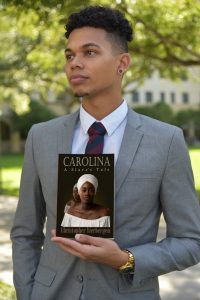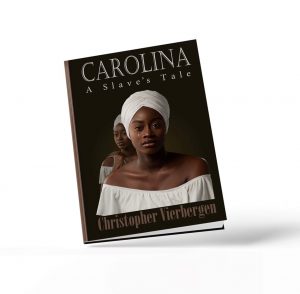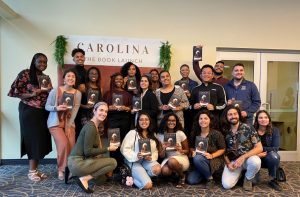Christopher Vierbergen (’21) is not only a Landscape Architecture, Environmental and Urban Design master’s student, he is also a newly published author. Vierbergen celebrated his first book launch Friday, Jan. 10 for his novel Carolina, A Slave’s Tale.
Carolina, is a two-time short story award winner and Vierbergen’s first publication for general readership. Following his second short story competition success in 2013 for his entry Carolina, Vierbergen decided to turn the story into a full-length novel.
As a Landscape Architecture, Environmental and Urban Design major, Vierbergen has always felt very passionate about protecting the earth and its inhabitants and empowering minority individuals. He took this passion to help him set the scene for his novel.
What is your book about?
Carolina, A Slaver’s Tale is about a young girl called Carolina, born into slavery in the 1800s in Curaçao, an island in the Dutch Caribbean. The novel details her life as she deals with having to be transported to a new plantation.
What inspired you to write this novel?
The inspiration for my book is largely attributed to a Curacaoan song about a folklore legend, written by Curacaoan artist Izaline Calister. I was first introduced to her song when I attended drama school and we did a play about slavery in 2012. I completely fell in love with her work. The piece is very culturally significant and details a deep storyline in only four minutes. I dedicated my book to Calister as I very much admire all that she has done for Curacaoan music and culture and since her song has meant so much for my story, I wanted to honor her in this way.
Where did you get your idea for this book?
I initially never planned to write this book, but in the summer of 2013, while I was still living in Curaçao, my mom told me about a short-story writing competition that was happening. Knowing that I have always held a passion for writing, she encouraged me to participate. I wasn’t really interested until I noticed that one of the categories that you could choose to write about was on the abolition of slavery. That immediately got my attention and I instantly began writing the stories that popped into my head. The panel of judges liked my submission so much that it ended up being the overall winner of the competition. They told me that this was a great story and that they would love to see it being turned into a book. That is how my journey of turning this 3-page story into a full-fledged book began. It took a total of six years to write the initial full draft, while also attending high school and later college.
Is writing something you’ve always wanted to do? 
I’ve been writing since I was about three years old and I have always thought of myself as being very creative, but I never imagined myself becoming a published author. It’s something that’s still a little surreal to me. I have, however, always known that I would do something in the arts. Initially, I imagined that it would be acting, but then I discovered Landscape Architecture and knew that this was the perfect track for me. It was an ideal way for me to unleash my creativity, while still promoting healthy environments, which is something I care deeply about. My life goal is to become a renowned Landscape Architect who can make significant impacts on my island, while every now and then is also able to write stories that have cultural/educational/environmental/historical significance.
How have you balanced writing this book with completing your Master’s in Landscape Architecture?
Time management is very important. The first thing I do every day before I get out of bed is to grab my phone and make a list of everything that I’d like to get done for the day. I can’t say I haven’t struggled, as it has been very hard to focus on both things, in addition to also holding a position as Resident Assistant here at FIU. Nevertheless, with dedication, ambition and working on things you love, you can make anything happen!
Has your education in Landscape Architecture helped you or influenced you in any way with this project? 
Studying Landscape Architecture has really helped me with this book. Even though they seem to be unrelated, they actually aren’t. This field reminds me every day that you have to stand up for what you believe in. Landscape Architecture has helped me carry out my passion for the environment and empowering minority individuals and through writing, I’ve been able to promote these areas as well. Landscape architecture has also helped me describe landscapes, which is very important to this book and its story.
Click here to purchase Carolina, A Slave’s Tale.



